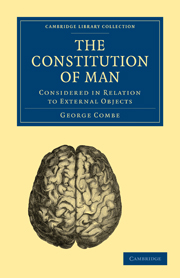Book contents
- Frontmatter
- PREFACE
- Contents
- CHAPTER I ON NATURAL LAWS
- CHAPTER II OF THE CONSTITUTION OF MAN, AND ITS RELATIONS TO EXTERNAL OBJECTS
- CHAPTER III TO WHAT EXTENT ARE THE MISERIES OF MANKIND REFERABLE TO INFRINGEMENTS OF THE LAWS OF NATURE
- CHAPTER IV ON THE COMBINED OPERATION OF THE NATURAL LAWS
- CONCLUSION
- APPENDIX
CHAPTER IV - ON THE COMBINED OPERATION OF THE NATURAL LAWS
Published online by Cambridge University Press: 29 August 2010
- Frontmatter
- PREFACE
- Contents
- CHAPTER I ON NATURAL LAWS
- CHAPTER II OF THE CONSTITUTION OF MAN, AND ITS RELATIONS TO EXTERNAL OBJECTS
- CHAPTER III TO WHAT EXTENT ARE THE MISERIES OF MANKIND REFERABLE TO INFRINGEMENTS OF THE LAWS OF NATURE
- CHAPTER IV ON THE COMBINED OPERATION OF THE NATURAL LAWS
- CONCLUSION
- APPENDIX
Summary
Having now unfolded several of the natural laws, and their effects, and having also attempted to shew that each is inflexible and independent in itself, and requires absolute obedience, so that a man who shall neglect the physical law will suffer the physical punishment, although he may be very attentive to the moral law; that one who infringes the organic law will suffer organic punishment, although he may obey the physical law; and that a person who violates the moral law will suffer the moral punishment, although he should observe the other two; I proceed to shew the mutual relationship between these laws, and to adduce some instances of their joint operation.
The great fires in Edinburgh, in November 1824, when the Parliament Square and a part of the High Street were consumed, will serve as one example. That calamity may be viewed in the following light:—The Creator constituted the countries of England and Scotland, and the English and Scottish nations, with such qualities and relationships, that the individuals of both kingdoms would be most happy in acting towards each other, and pursuing their separate vocations, under the supremacy of the moral sentiments. We have lived to see this practised, and to reap the rewards of it. But the ancestors of the two nations did not believe in this constitution of the world, and they preferred acting on the principles of the propensities; that is to say, they waged furious wars, and committed wasting devastations, on each other's properties and lives.
- Type
- Chapter
- Information
- The Constitution of ManConsidered in Relation to External Objects, pp. 260 - 282Publisher: Cambridge University PressPrint publication year: 2009First published in: 1828

